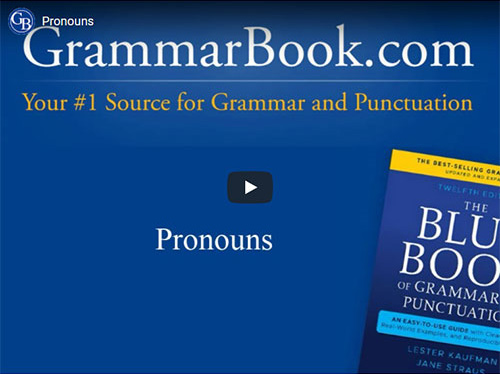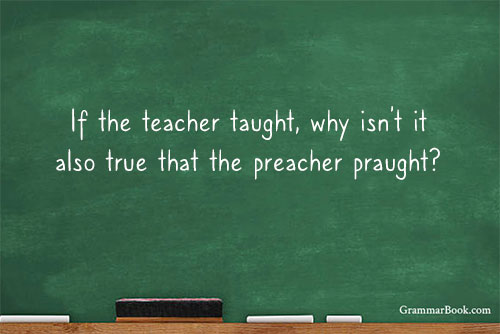|
Having trouble viewing this message? Click here to view it online.
To unsubscribe or change contact details, scroll to the bottom and follow the link.
|



|
|
What Is the Vocative Case in English?
|
|
Would you please hand me that flower vase, my dear?
Joaquin, how much rice does the recipe call for?
You know, my friend, I'm not sure if we're going to make it on time. |
Most of us are familiar with expressions like these. We might also communicate in similar ways when writing salutations such as Dear Mrs. Walker.
Vocative Case: Definition and Examples
The use of nouns and noun phrases right above has its own grammatical category known as the vocative case. The vocative case identifies someone or something being addressed. Because it involves a form of direct address, the vocative case stands in for the pronoun you to specify who you is in an exchange:
Joaquin, how much rice does the recipe call for?
(You), how much rice does the recipe call for? |
You'll most commonly see the vocative case being used with proper nouns, especially names:
Hi, Richard.
Your Majesty, have you seen the duchess's croquet mallet?
Thank goodness you're here to end the week, Friday!
I'm afraid, Mr. Dracula, that I failed to take your cape to the dry cleaner. |
You can also use the vocative case for common nouns, animals, and inanimate objects:
Kind person, do you have a moment to assist me?
Here, kitty-kitty!
Drain, I command you to unclog! |
Vocative Case: The Vocative Comma
The presence of the vocative case informs us that certain nouns or noun phrases are being directly addressed as opposed to serving as other sentence components.
The person or thing being addressed is identified by the vocative comma (or by a slight pause when speaking). Without the vocative comma or commas, we would often have ambiguity concerning the writer's intent. Compare the following sentences:
I don't know John, but he sounds like he's a good person.
I don't know, John, but he sounds like he's a good person.
That appears to be sugar honey.
That appears to be sugar, honey. |
In the first pair, the first sentence treats John as a direct object: I don't know him (John). In the second sentence, we are expressing our observation to John.
In the second sentence pair, for all we know, sugar honey could be a new type of sweetener. In the second sentence, because of the vocative case, honey is better understood to be a term of endearment.
Let's look at how more sentences can be interpreted if the vocative case is not clear:
I say we eat Dad.
Have you given up Grandma?
Guilty, you are clearly not my friends. |
If the same sentences include proper vocative commas, we have:
I say we eat, Dad.
Have you given up, Grandma?
Guilty, you are clearly not, my friends. (or Guilty you are clearly not, my friends.) |
Vocative Case: Punctuation with Placement
As you've seen in the examples thus far, the vocative case can be used in the beginning, middle, or end of a sentence.
When using the vocative case, you want to ensure that other punctuation in the sentence is correct. For example, if a sentence ends in the vocative case before another sentence begins, the first sentence should conclude in a period. If the first sentence introduces a following statement, it should end in a colon:
Correct: It's true, Shanice. You did win the scholarship.
Correct: It's true, Shanice: You did win the scholarship.
Incorrect: It's true, Shanice, you did win the scholarship. |
The last sentence is a fused (run-on) sentence.
If the vocative case begins a sentence, we insert a vocative comma after the vocative reference:
| Adam, please hand me those figs. |
If the vocative case appears in the middle of a sentence, we place a vocative comma before and after the reference:
| I am committed to completing the project, Mrs. Christiansen, and I will update you on my progress. |
Related Topics
Should You Use a Comma After Hello?
Commas in Titles
Hitting the Right Notes with Salutations and Closings
|
View and comment on this
article on our website.
|
|
|

|
Pop Quiz
Test your knowledge of the vocative case by punctuating its use correctly in the following sentences.
1. We've already met Jolene and it was at your father's birthday party.
2. Mrs. O'Cleary we would like you to have this token of our appreciation.
3. Stop doing that you little rascal!
4. This is a defining day my fellow board members as we decide whether to proceed with the merger.
5. My dear Charlton would you please bring me a cup of tea?
|
 |
The Blue Book of Grammar and Punctuation
by Lester Kaufman and Jane Straus |
The Authority on English Grammar! Twelfth Edition Now Available
An indispensable tool for busy professionals, teachers, students, homeschool families, editors, writers, and proofreaders.
Available in print AND as an e-Book! Over 2,000 copies are purchased every month!
To order the book, simply click the link to order the book from the GrammarBook.com website.
|
Get Even More Useful Grammar Tips
In addition to our weekly newsletter, we post new entries about American English grammar. The following is our most recent article. Bookmark our GrammarBook blog and be sure to check it often.
What Is the Plural of Status?
|
Free BONUS Quiz for You!
[[firstname]], because you are a subscriber to the newsletter, you get access to one of the Subscribers-Only Quizzes. Click here to take a Whoever vs. Whomever Quiz and get your scores and explanations instantly!
We will be adding many more quizzes this year to our already substantial list of them. If you have suggestions for topics we have not yet covered, please send us a message at help@grammarbook.com.
|
Hundreds of Additional Quizzes
at Your Fingertips
Subscribe now to receive hundreds of additional English usage quizzes not found anywhere else!
Teachers and Employers
Save hours of valuable time! You may assign quizzes to your students and employees and have their scores tallied, organized, and reported to you! Let GrammarBook.com take the hassle out of teaching English!
"Fun to test my skills."
"The explanations really help ... thanks!"
"I can select the quizzes to assign to my students, and then the results are reported to me automatically!"
If you think you have found an error in a quiz, please email us at help@grammarbook.com
|
Wordplay

Pop Quiz Answers
1. We've already met, Jolene, and it was at your father's birthday party.
2. Mrs. O'Cleary, we would like you to have this token of our appreciation.
3. Stop doing that, you little rascal!
4. This is a defining day, my fellow board members, as we decide whether to proceed with the merger.
5. My dear Charlton, would you please bring me a cup of tea?
|
 |
English In A Snap:
68 One-Minute English Usage Videos FREE |
Learn all about who and whom, affect and effect, subjects and verbs, adjectives and adverbs, commas, semicolons, quotation marks, and much more by just sitting back and enjoying these easy-to-follow lessons. Share them with your colleagues (and boss), children, teachers, and friends as well! Click here to watch.
|
|





